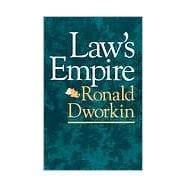
Note: Supplemental materials are not guaranteed with Rental or Used book purchases.
Purchase Benefits
Looking to rent a book? Rent Law's Empire [ISBN: 9780674518360] for the semester, quarter, and short term or search our site for other textbooks by Dworkin, R. M.. Renting a textbook can save you up to 90% from the cost of buying.
| What Is Law? | p. 1 |
| Why It Matters | |
| Disagreement about Law | |
| The Plain-Fact View | |
| A Threshold Objection | |
| The Real World | |
| Semantic Theories of Law | |
| The Real Argument for Semantic Theories | |
| Interpretive Concepts | p. 45 |
| The Semantic Sting | |
| An Imaginary Example | |
| A First Look at Interpretation | |
| Interpretation and Author's Intention | |
| Art and the Nature of Intention | |
| Intentions and Practices | |
| Stages of Interpretation | |
| Philosophers of Courtesy | |
| A Digression: Justice | |
| Skepticism about Interpretation | |
| Jurisprudence Revisited | p. 87 |
| A New Picture | |
| Concepts and Conceptions of Law | |
| Skeptical Conceptions and Wicked Law | |
| Grounds and Force of Law | |
| Conventionalism | p. 114 |
| Its Structure | |
| Its Appeal | |
| Legal Conventions | |
| Two Kinds of Conventionalism | |
| Does Conventionalism Fit Our Practice? | |
| Does Conventionalism Justify Our Practice? | |
| Pragmatism and Personification | p. 151 |
| A Skeptical Conception | |
| Does Pragmatism Fit? | |
| Law without Rights | |
| The Claims of Integrity | |
| Community Personified | |
| Integrity | p. 176 |
| Agenda | |
| Does Integrity Fit? | |
| Is Integrity Attractive? | |
| The Puzzle of Legitimacy | |
| Obligations of Community | |
| Fraternity and Political Community | |
| Untidy Endnotes | |
| Integrity in Law | p. 225 |
| A Large View | |
| The Chain of Law | |
| Law: The Question of Emotional Damages | |
| A Provisional Summary | |
| Some Familiar Objections | |
| Skepticism in Law | |
| The Common Law | p. 276 |
| The Economic Interpretation | |
| Complexities | |
| The Question of Justice | |
| The Utilitarian Duty | |
| The Egalitarian Interpretation | |
| Equality and Comparative Cost | |
| Private People and Public Bodies | |
| Statutes | p. 313 |
| Legislative Intention | |
| Speaker's Meaning Convictions | |
| Hercules' Method | |
| Legislative History | |
| Statutes over Time | |
| When Is the Language Clear? | |
| The Constitution | p. 355 |
| Is Constitutional Law Built on a Mistake? | |
| Liberals and Conservatives | |
| Historicism | |
| Passivism Hercules on Olympus | |
| Theories of Racial Equality | |
| Deciding Brown | |
| Deciding Bakke | |
| Is Hercules a Tyrant? | |
| Law Beyond Law | p. 400 |
| Law Works Itself Pure | |
| Law's Dreams | |
| Epilogue: What Is Law? | |
| Notes | p. 417 |
| Index | p. 455 |
| Table of Contents provided by Rittenhouse. All Rights Reserved. |
The New copy of this book will include any supplemental materials advertised. Please check the title of the book to determine if it should include any access cards, study guides, lab manuals, CDs, etc.
The Used, Rental and eBook copies of this book are not guaranteed to include any supplemental materials. Typically, only the book itself is included. This is true even if the title states it includes any access cards, study guides, lab manuals, CDs, etc.